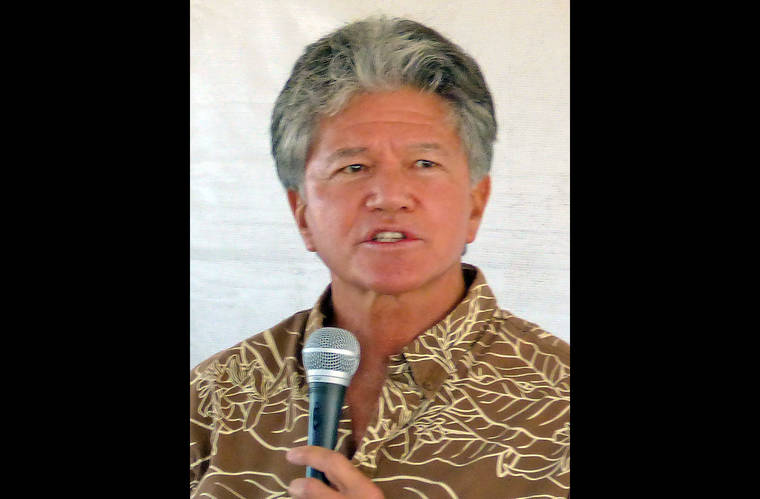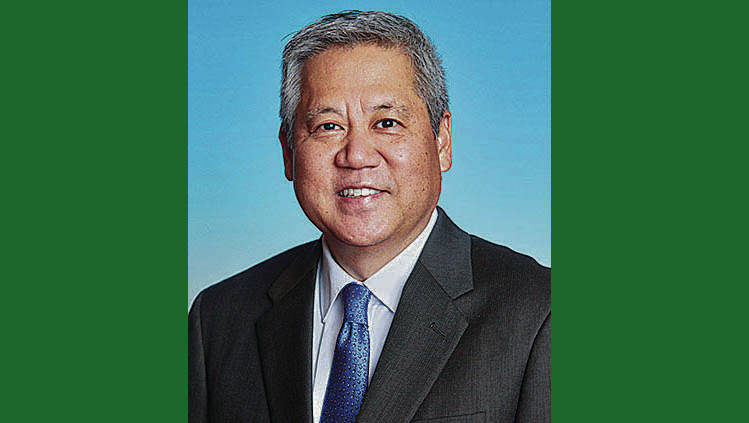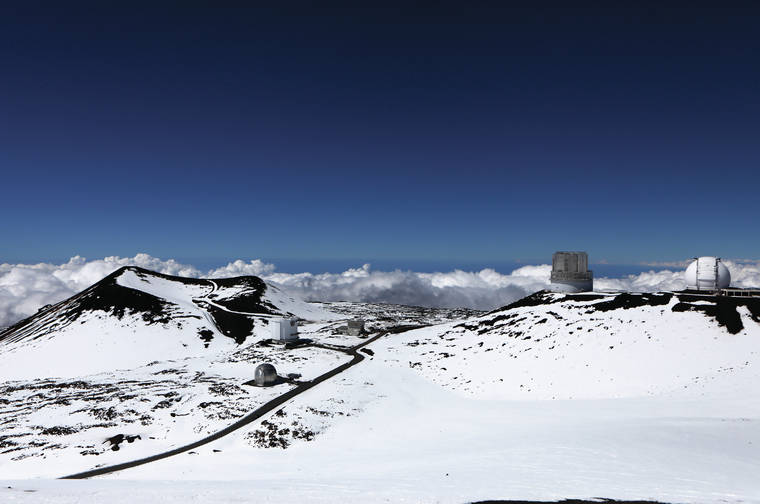The University of Hawaii’s director of Maunakea stewardship said the university will continue its process to renew the master lease for the mountain, which hosts several of the world’s premier astronomical observatories.
Responding Tuesday to a call by state House Speaker Scott Saiki for the university to step down from its role as manager of the mountain, Greg Chun said UH will “continue to move forward on all of those things that we’re responsible for, because we have to, we need to.”
In a brief floor speech before the House, Saiki said the university “should no longer manage Maunakea, and it should cease its work to extend the master lease.”
The UH lease for the 11,288-acre Maunakea Science Reserve expires in 2033, and a nonexclusive easement for the Maunakea Access Road, about 71 acres, also expires in 2033. The lease for the 19-acre Halepohaku mid-level facility expires in 2041.
“The university has tried its best to manage Maunakea, but for too long, the university’s work has been shrouded by its inability to appropriately manage cultural practices, resources and education,” Saiki said.
The mountain was the site of protests and arrests in 2019, when opponents of the Thirty Meter Telescope project staged a massive blockade of the access road, stalling construction activities for months before winter. Then the coronavirus pandemic set in, further delaying the next-generation observatory.
Describing those demonstrations as “a manifestation of what happens when we draw lines, work in silos and disregard different views,” Saiki said the House “will introduce a resolution to begin the process of reassessing a new governance structure for Maunakea. And we will invite ku kia‘i Maunakea to have a seat on the table and be a part of the discussion.”
Kia‘i, which means “protector,” is a word TMT opponents use to describe themselves. One of the leaders of the kia‘i, Noe Noe Wong-Wilson — an academic, Hawaiian cultural practitioner and executive director of the nonprofit Lalakea Foundation — said she was surprised by Saiki’s announcement and is “cautiously optimistic.”
“We have been on opposite sides of the table for so long that it is welcome news to think that he is willing to call for a change in the management of the mauna, which is something we’ve been calling for, for awhile,” Wong-Wilson said. “And he further made a bold statement that any further movement on any renewal of the lease should cease, immediately.
“Where we go from there, and what the new structure would look like, I really am not privy to any details. He talked about kia‘i having a seat at the table, and I’m not sure what that means, or what process will take place to decide who that is, or what group represents us.”
Kealoha Pisciotta, president of Mauna Kea Anaina Hou, an organization of Native Hawaiian cultural practitioners opposed to telescope construction, went even further, favoring a bill introduced to the Legislature calling for no further development on the summit.
“You need to remove the injury before you begin talking about anything else,” Pisciotta said.
While the master lease is held by UH, the future of that lease and whom it will be entrusted to is vital to the astronomy community.
“The Maunakea Observatories share Speaker Saiki’s view that long-lasting solutions cannot come from drawing lines, working in silos or disregarding different perspectives,” said Doug Simons, director of the Canada-France-Hawaii Telescope. “We have confidence that a path forward can be found to serve the community’s collective interest, and will commit to supporting productive collaboration that seeks solutions, cognizant of the need to reach a timely resolution.”
Chun said for the observatories, “the security of knowing who the landowner is going to be is extremely important to them … so that they can make decisions about improvements to their facilities going forward.”
“So, it affects everybody, actually. It doesn’t just affect TMT,” he said.
While the master lease has a dozen years remaining, UH has numerous processes remaining in its quest for renewal, including a stalled Environmental Impact Statement and updates to its master plan.
Among the revisions to the master plan will be a series of land use goals for each of the astronomy sites on the summit. While most of the sites will remain as they are now, the master plan will include a process to reduce the number of active sites to nine by 2033 as a condition of the planned construction of TMT.
“Even before today, we had reached out to provide briefings to all of the elected officials, including the majority caucus in the House, on the status of various things that we’re working on,” Chun said. “I’m actually scheduled to do … the university’s annual report to the Board of Land and Natural Resources next week. … This topic … obviously will come up when that happens.”
Chun said the university needs certainty about its lease extension plans in “the next couple of years.”
“And it’s not just us at the university, it’s really for all of the observatories,” he said. “Otherwise, without that certainty, the option is everybody will need to file their notices to decommission. Providing that security is important. One of the challenges, I think, with implementing a new management structure at this point will be that it will delay that process. It’ll likely delay the process of finalizing an agreement as to who would be holding the new land authorization and, therefore, who the observatories would be dealing with.”
According to Chun, UH is “fully committed” to “sit down with whoever and work with whoever in whatever way that we can to move things forward.”
“The university is privileged, quite frankly, to be responsible for managing these lands. These are very special lands. We understand that,” he said. “And the challenge is — because these are public lands — to try to find that balance amongst the multiple values that people associate with Maunakea.
“Those challenges are not unique to the university. Anybody sitting in our position would be facing those challenges.”
The Associated Press contributed to this story
Email John Burnett at jburnett@hawaiitribune-herald.com.











